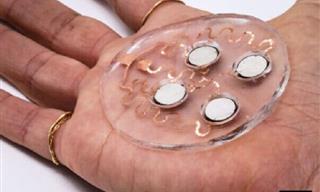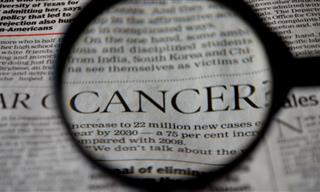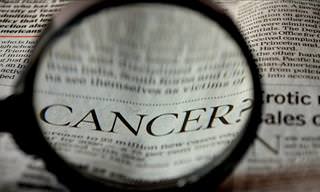Cancer is widely regarded as a modern disease. Many of us think nostalgically about times centuries ago, before the industrial revolution, when the air was clean of pollutants and the water everywhere was good for drinking. We think of the times when our ancestral fathers fed off the land and were free of diseases. But that is hardly the case.
Cancer in the prehistoric ages
In 1932 anthropologist Louis Leakey discovered clear signs of bone cancer in a prehistoric jawbone. To this day there are still arguments about the exact time period from which this bone originated but since this is a fully fossilized petrified bone, we're satisfied with the definition “prehistoric“ as proof of primordial cancer.
The earliest written documentation of cancer is found in ancient Egypt. Various sources state various years, but this was anywhere between 3000 and 1500 BC, when an Egyptian doctor documented the different illnesses, his patients suffered. Among them, he wrote about what could only be described today as breast cancer. At the time there was no known cure, as stated on the papyrus.
Cancer in ancient times

Later in ancient Greek, Hippocrates, on which we based the Hippocratic oath and is considered the father of modern medicine, also documented different sightings of cancer. He used the Greek word for crab to describe the way growths latch on tissues and spread out in the body. This gave us the word cancer.
Throughout prehistoric and ancient times as well, the reasons for cancer were unknown. This disease was either believed to be from the gods or from unbalanced bile fluids in the body. But with the age of enlightenment in the 17th century, humanity started closing in on understanding cancer. The first ever autopsy was conducted during the early 17 century. This was a tool for us to learn about inner anatomy, which led to the discovery of the circulatory system, the bloodstream, and the lymph liquid. This gave researchers new clues about how cancer spreads in the body, but there was still no knowledge whatsoever about how cancer evolves, and more importantly how to fight it.
Research after the renaissance
But the age of enlightenment didn’t leave us empty-handed. It left us with scientific tools and measures for precise observations. Now science was at the forefront.
Sir Percival Pott was the first to associate cancer with inflammation caused by external exposure to carcinogens. “He observed an unusually high incidence of skin sores on the scrotum of men working as chimney sweeps in London.“ Source
A German surgeon named Karl Thiersch was the first to prove that cancer spreads through malignant cells.
In the 19th century, when physician Rudolph Virchow discovered that cancer cells form from human cells another piece was added to the puzzle. From there, the road to treatment was short.
Modern achievements
In 1882 William Halsted performed the first ever radical mastectomy to treat breast cancer. He was also the one to introduce the use of thin rubber gloves and local anesthesia.
As science and technology evolved and expanded, so did our knowledge on cancer. In 1903, S. W. Goldberg and Efim London were the first to cure cancer with radiation therapy. Later on, scientists discovered that cancer can also be caused by viruses and chemicals. But the progress was anything but linear. In 1926 and noble prize was given to Johannes Andreas Grib Fibiger for his discovery of a so-called cancer-causing worm. “Johannes Fibiger suspected that a roundworm cause cancer […] However, it later turned out that the primary cause of the cancer was a lack of vitamin A“. Source
But finally in 1953, we achieved the first complete cure of a solid human tumor by way of chemotherapy.
Sources: 1, 2, 3.
 Go to BabaMail
Go to BabaMail


























































